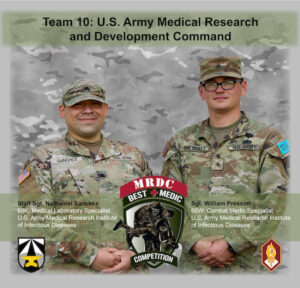
Story by Quentin Johnson
United States Army Medical Research Institute of Infectious Diseases
FORT DETRICK, Md. – Staff Sgt. Nathaniel Sanchez and Sgt. William Prescott of the U.S. Army Medical Research Institute of Infectious Diseases took first place among the teams representing the U.S. Army Medical Research and Development Command at the joint MRDC/Medical Readiness Center-East Army Best Medic Competition at Fort Walker, Virginia, Sept. 18.
Sanchez and Prescott were among more than 20 U.S. Army medical personnel who competed as two-person teams in the grueling 72-hour competition, which took place Sept. 14-18.
Prescott, a combat medic, says, “We were definitely surprised and didn’t expect to win; We would have just been happy with the experience.”
This year’s competition began with 11 teams and was designed to challenge medical personnel physically and intellectually in a simulated tactical environment.
Competitors were tested on their physical fitness, including walking and sprinting multiple miles throughout the competition, as well as on their tactical pistol and rifle marksmanship, land navigation skills, and overall knowledge of medical, technical, and tactical proficiencies through hands-on tasks.
Prescott says they trained hard because they wanted to perform at a higher level than the competition even though he and Sanchez knew what to expect in advance.
“We trained for three to four months focusing on strength training, tactical casualty care and field care,” says Sanchez, a medical laboratory specialist.
While Prescott found the physical tests to be the most challenging aspect of the competition and Sanchez found the mental tests to be the hardest, both agreed it was a combination of the two during the lanes that provided them their greatest difficulty.
“The medical lanes were the most challenging,” says Prescott. “It was extremely hot and physically straining.”
The competition is designed to test Warfighters’ medical proficiency and leadership while working together as a team.
“[The challenges] made me realize our team composition was strong and we balanced each other’s strengths and weaknesses really well,” says Sanchez.
Prescott agreed, saying that while he was physically okay completing most of the competition, he relied on his teammate many times to mentally motivate him to keep going and finish the events.
In the end, Sanchez’s and Prescott’s hard work and mental toughness paid off with a win and lessons learned for their next steps to a larger and more difficult competition.
“I am stronger than I thought, I pushed myself further than I thought I could and now have more mental fortitude,” says Prescott.
“At the end of the day when everything kicks off the skills will come back when it matters most, so trust your gut and trust your training,” says Sanchez.
The team is scheduled to represent MRC-E and MRDC at the Command Sgt. Maj. Jack L. Clark Army Best Medic Competition at Fort Sam Houston, Texas, in February 2025.